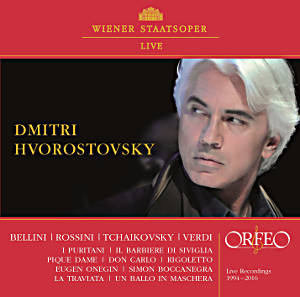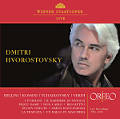
NEW RELEASES
NEW RELEASES of the last 12 months
COMING SOON
ARCHIVE
AWARDS
CDs
SACDs
LPs
MCs
CATALOGUE NUMBERS
|
|
ORFEO International – Catalogue
CDs
 | Dmitri HvorostovskyBellini | Rossini | Tchaikovsky | VerdiOrfeo • 1 CD • 78min Order No.: C 966 181 B |
|
Composers/Works: |
V. Bellini: Ah! Per sempre ti perdei (1st Act: Riccardo, Bruno - from: I Puritani)
G. Rossini: All' idea di quel metallo (1st Act: Figaro, Conte Almaviva - from: Il barbiere di Siviglia)
P. Tschaikowsky: Ya vas lyublyu (2nd Act: Fürst Jeletzsky - from: Pique Dame)
G. Verdi: Signora! Per Vostra Maestà – Che mai si fa nel suol francese – Carlo, ch’è sol i (1st Act: Posa, Eboli, Elisabetta - from: Don Carlo)
G. Verdi: Pari siamo – Figlia! Mio padre! (from: Rigoletto)
P. Tschaikowsky: Vi mnye pisali – Kogda bi zhizn domashnim krugom (1st Act: Tatiana, Eugen Onegin - from: Eugen Onegin op. 24)
G. Verdi: Plebe! Patrizi! Popolo! (1st Act: Simon Boccanegra, Coro, Amelia, Gabriele Adorno, Fiesco, Pietro, Paolo - from: Simon Boccanegra)
G. Verdi: Pura siccome un angelo (2nd Act: Giorgio Germont, Violetta - from: La Traviata)
G. Verdi: Alzati! – Eri tu che macchiavi quell'anima (3rd Act, 1st Scene: Renato - from: Un ballo in maschera)
|
Artists: |
Dmitri Hvorostovsky (Bariton)
Chor der Wiener Staatsoper (Chor)
Orchester der Wiener Staatsoper (Orchester)
|
Dmitri Hvorostovsky: Bellini | Rossini | Tchaikovsky | Verdi
Born in Krasnoyarsk in 1962, Dmitri Hvorostovsky is known to us only with snow-white hair. That – along with his precociously mature and sonorously dark baritone – made him almost ageless, as in his Eugene Onegin under Kirill Petrenko (2010) , who writes Tatyana a letter taking her to task for her passionate declaration of love and declining it, 
C 966 181 Bor his Prince Yeletsky a year earlier in The Queen of Spades, when he declares in vain his love for Lisa. Both roles were prime examples of the baritone’s Russian repertoire.
First comes bel canto like I Puritani with the 31-year-old singing under the baton of Plácido Domingo and a duet as Figaro with the Count Almaviva of Michael Schade. In the Romance from Bellini’s last opera, Riccardo laments the loss of his promised bride, who sustained him during his years of restless wandering. By contrast, the Barber and the Count engage in eloquent and musically fluent dialogue on how the beloved Rosina is to be won, with the proviso that the help offered is to be richly rewarded.
Dmitri Hvorostovsky stands out above all on this album as a true Verdi baritone: as Posa (Don Carlos), for example, and in paternal roles. It is all to the good, given their dramatic impact, that ensemble scenes dominate: the quartet in which Hvorostovsky plays Rigoletto alongside Patrizia Ciofi, Ramón Vargas and Donna Ellen, or Hvorostovsky’s Simon Boccanegra in the finale of Act I of Verdi’s eponymous and all too rarely performed opera. By then, Hvorostovsky’s cancer was far advanced and much of his singing lacks the effortlessness of decades earlier. But this is more than compensated for by the depth of his characterization, which makes us overlook any shortcomings elsewhere.
The climax is his moving aria as Anckarström in the original Swedish version of Un ballo in maschera, in which he fears he has lost the love of his wife. It ends with the bitter-sweet resignation of “O dolcezze perdute, o speranze d’amor” (O sweet moments lost, O vain hopes of love).
Before that, Hvorostovsky is to be heard in the role of a father convinced of himself and of his own moral standards, Padre Germont (La Traviata), who persuades Violetta (Marina Rebeka) to renounce her beloved Alfredo. The performance is that of November 29, 2016; scarcely a year later, Hvorostovsky succumbed to the cancer with which he had wrestled for so long – aged just 55. Here we hear the pitiless rigour with which, despite feigned sympathy, he pronounces the fate of a dying woman and takes from her the best thing she had ever known – true love.
Translation: Janet and Michael Berridge, Berlin
|
|

ORFEO
Chormusik & Oratorien
Edition zeitgenössisches Lied
Kammermusik
Lied
Musica Rediviva
Oper
Recital
Symphonie & Konzert
Weihnachten
ORFEO D'OR
Bayerische Staatsoper live
Bayreuther Festspiele live
Deutsche Oper am Rhein
Salzburger Festspieldokumente
Wiener Staatsoper live
Wiener Symphoniker
Dirigenten
Große Sänger d. 20. Jh.
Orchesterkonzerte
Quartette
Solisten
|